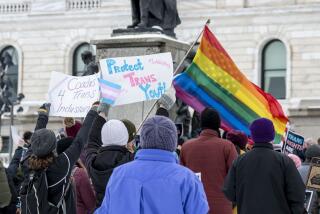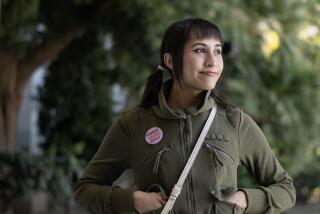As Teens, AIDS ‘Babies’ Have a Secret to Share
- Share via
CHICAGO — Known as AIDS babies, they are children born HIV-positive who contracted the virus from their mothers. No one expected them to live very long in the early days of the epidemic. But today, many are thriving teens facing a new set of challenges. This is the story of one of them, found with the help of her social worker and doctors at Children’s Memorial Hospital in Chicago -- and with the understanding that she, her family members and friends would not be identified.
*
CHICAGO -- If ever there was a time to tell her big secret, this was it, the seventh-grader thought.
She and a few friends -- in pajamas at a sleep-over birthday party -- had sequestered themselves in a storage closet under a basement stairwell. They sat in a circle, some on the floor, some on boxes, and talked for hours, promising, “Whatever we say here, stays here.”
One girl shared her fear that her parents were on the verge of divorce. Another said she felt pressure to live up to her brother’s example.
There was silence for a moment. Then the girl who’d kept quiet for so many years took a deep breath and blurted a few quick words.
“I have something to say,” she said. “I’m HIV-positive.”
Until then, her friends had simply known her as their fun-loving buddy, the honors student, the girl with sarcastic wit who was as likely to use a big word they didn’t understand as to address her friends as “dude.” She was the prolific short-story writer who liked to escape for hours in a Harry Potter book or science-fiction story. She was the one with a reputation for embarrassing her friends by wearing goofy clothes in public or singing at the top of her lungs as they walked down the sidewalk.
Now her friends knew something more: She was born an “AIDS baby” -- a term only vaguely familiar to most people her age because they are too young to remember when most HIV-positive children were born in this country.
Early on, the diagnosis was a death sentence, with few children living long enough to attend kindergarten. Eventually, new drugs emerged and the prognosis brightened for a population of young survivors who have quietly but tenaciously outlived life-expectancy predictions.
Many of those young people are reaching adolescence -- a confusing and sometimes anxious time for anyone -- making “coming out” to friends and people they’re dating that much more difficult.
“It is a complicated, sophisticated and terrifying task that they should not be expected to master alone,” said Erin Leonard, a social worker who counsels HIV-positive teens at Chicago’s Children’s Memorial Hospital. Her clients include the teen who revealed her HIV status at that birthday party two years ago. (Associated Press reached the girl through her doctors and Leonard. The teen, her family and friends spoke on condition of anonymity.)
Now 14 and a freshman in high school, she is glad that she told those few friends, who seem to have taken the news in stride.
“I was a teensy bit worried about how they would react. But it all turned out OK,” she said with a nonchalance that belies the magnitude of her revelation -- and the steps she sometimes still takes to hide her secret.
This is a girl who stopped taking her medication during the two weeks she was at camp this summer so her counselors wouldn’t ask questions.
To protect their privacy, and to avoid hassles and discrimination, she and her parents also have chosen not to share her condition with the principals and teachers at her schools. (According to legal experts, Illinois law requires that public health officials -- not the family -- inform her school, and then only if she develops AIDS.)
For now, the teen also has not told her boyfriend.
“When I do tell him, I want him to know that he’s special for having known it,” she said. “But I’m freaked out that if I tell him, every time we make out, he’s going to think, ‘Oh my God.’ ”
*
When her mother got pregnant, she had no idea that she had contracted the AIDS virus from a former boyfriend years earlier. So when her daughter was born in 1989 at a Chicago hospital, no one realized that the child was HIV-positive.
Doctors found the first sign of trouble -- swollen glands -- during one of the baby’s first checkups. They tested for cancer and other ailments, and did a spinal tap and biopsy of a lymph node, but found nothing. In the fall of 1990, they checked for HIV.
The test came back positive -- shocking her parents, both young professionals who didn’t fit the high-risk profile of people whose children were born with the AIDS virus. Her mother, who learned soon after that she also was HIV-positive, calls the day they found out “one of the most devastating” of her life.
“I got this because of choices I made. She had no choice,” she said, sitting on a couch with her daughter in their apartment living room. She rubs her daughter’s forehead as tears well up in her own eyes. “I feel bad that I gave her this like I gave her her brown eyes and pug nose.”
Her father remembers that day too. He is not HIV-positive, but recalls having to step out of the doctor’s office to be alone after hearing the test results.
“How could this happen?” he asked himself. “For a little kid to have it, it didn’t even register.”
Doctors told them that their daughter would probably not live past age 4.
“As a mother, part of me refused to accept not the diagnosis, but the prognosis,” she said. “You could call it denial. I would call it faith.”
Her parents started giving their daughter the drug AZT in liquid form, mixed with apple juice in her bottle. Today, she takes two batches of seven pills each day -- one in the morning, one at night. “For a long time, I thought all kids took medicine like I did,” she said.
Since she has been taking this latest round of medication over the last five years, the virus has been undetectable in her blood (although that doesn’t mean that it’s not there).
Tests also indicate that her immune system is very strong.
“It’s like I’m normal and I’m not sick,” she said. “But I am.”
*
For years, even she didn’t know that she was HIV-positive, only that she and her mom both took medicine for some unspoken ailment.
“There’s something wrong with our blood, and the medicine helps keep us from getting sick,” her mother would tell her.
Still, while her parents wanted to shield their daughter from HIV as much as they could, the stress for them as a couple became too much. They separated in 1995, when their daughter was 5. Her father eventually started dating another woman and, in 1997, proposed marriage. A month before the wedding, he told her that his daughter was HIV-positive -- and immediately things got difficult.
“I did my best not to treat her differently. But there were times when the HIV was definitely an issue,” her stepmother said.
The girl was confused and upset that the rules were different at her father’s new home. Why, she asked, was her stepmother insisting that she wrap her used Band-Aids in plastic and flush them down the toilet? Why was her laundry washed separately?
When she had cold sores, should she really not kiss her father, as her stepmother suggested?
The girl’s mother knew that she had to explain. So she sat her 8-year-old down and, with the help of a nurse and a psychologist at Children’s Memorial, broke the news.
“This is what we have, and you got it from me when you were born,” her mother remembered saying. “I always said it in terms of ‘we’ because it made it seem less scary.”
They went through some ground rules. “If you are bleeding, make sure whoever helps you is wearing gloves,” her mom told her. “But you don’t have to worry about kissing your father or hugging your friends.”
As adolescence approached, more of the harsh realities of being HIV-positive became apparent. She was mortified when her doctor insisted on having a birds-and-bees discussion after her first junior high “make-out session” with a boy.
More recently, she learned that someone had spread her secret when a boy she met at camp called to ask if she was HIV-positive.
She told him that she was, then panicked.
“It makes me feel really angry -- like I’m not in control of my life,” she said at the time.
She worries that people who don’t know her well won’t understand how she contracted the virus. She fears that they’ll call her a “whore.”
And what if one of them tells her boyfriend? That’s something she wants to do in her own time, if they stay together -- and if they decide to have sex, something she’s not considering now.
“I’ve learned from my mother’s mistakes,” she said.
Still, the stress of having to deal with it -- as much as she tries to lead a normal life -- can get to her. Last year, doctors insisted that she see Leonard, the social worker, after she vented some seething anger about her stepmother in an online journal. Her usually stellar grades also suffered. And, as her mother put it, her daughter “shut down” for a time and refused to talk to her.
“You’re going down a black hole, becoming a beast,” the teen remembered her mom yelling at the time.
Things are better now. She has chosen to continue to meet weekly with Leonard. In school, she’s carrying a full load of college prep classes, she’s in the choir and she made the debate team. She also wants to run track.
“Here I am thinking about prom and college and how I want to live in Paris for a year,” she said. “It’s a given that I’ll be here for that -- at least, that’s how it seems it should be.”
Doctors believe that she’ll be able to have a family one day. They are treating her condition as if it were a chronic illness.
It’s enough to give the teen hope that they may someday find a cure -- “maybe by the time I’m 25,” she said. “Who knows.”
Either way, she envisions the day when she won’t care if anyone knows that she’s HIV-positive: “I’d like people to say, ‘Look at her -- she’s a good writer and good student and she’s HIV-positive. I guess it’s not that bad.’ ”
More to Read
Sign up for Essential California
The most important California stories and recommendations in your inbox every morning.
You may occasionally receive promotional content from the Los Angeles Times.













